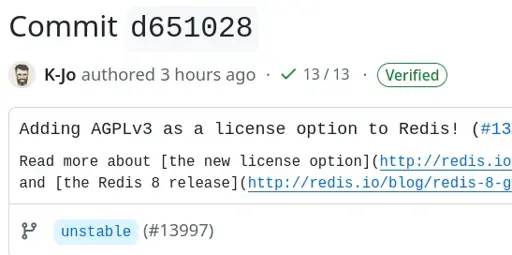- 58 Posts
- 466 Comments
The platform that works closest to this is https://www.liberapay.com/
It used to allow making 1 monthly payment and spreading it between projects. But they had to change to comply with banking/payment platform rules so each money transfer is directed to one beneficiary from the get go. Meaning you setup a recurring payment per project.
There’s also the nlnet foundation https://nlnet.nl/
It’s possible to give them 1 recurring payment to support OSS projects. But they manage how the money is split between projects and their own overhead. You don’t pick the projects.
Separating data structure from implementation has benefits.
In languages with classic OOP classes and objects, it’s often necessary to write wrappers or adapters to allow new operations on existing objects. This adds overhead and require more code.

 8·21 days ago
8·21 days agoWe don’t need another centralized messaging service in the EU. We need a secure and decentralized one. Such protocol already exist such as XMPP, Matrix, Briar, Ricocher, RCS, …

 2·22 days ago
2·22 days agoYes, this is fucked.
I doubt a sane society would aim to replace as many jobs as possible with automation, or necessarily be happy with it. Making this a goal mean trying to remove humans and unions out of the equations.
A sane society may seek to decrease workplace injuries and be more efficient, ie wasting less resources while producing stuff. That could involve better workplace conditions, better product design, and maybe automation. Automation may incidentally replace some tasks, even though it’s not the end goal.
Write tests.

 9·26 days ago
9·26 days agoIt’s outdated information rather than false information. It was true at the time the article was written.
It deserve to be updated with a notice, maybe not taken down.

 18·1 month ago
18·1 month agoLiterally who is their target market at this point.
Confused people

 2·1 month ago
2·1 month agoA new paper that has not yet been peer-reviewed, first noticed by Live Science, suggests that the invisible forces that fill the universe might be a viscous fluid.
Sounds like an hypothesis rather than a theory.

 5·1 month ago
5·1 month agoWe plan to be a wildly successful company, but if we get it wrong, that’s on us.
That’s incorrect. If OpenAI get this wrong, they won’t (be able to) make investor whole. People would loose part of their savings if they’re exposed to OpenAI through direct or indirect investments.
Even if they get it right, everyone suffers from the pollution caused by AI datacenters, and from the opportunity cost since investors are pouring resources in this hyped technology rather than more reponsible things like renewables, energy efficiency, …

 71·1 month ago
71·1 month agoTrump is a pretty good return on investment for Putin

 14·1 month ago
14·1 month agoCory Doctorow is an international treasure

 16·1 month ago
16·1 month agoOf course cooking is preferable, but it’s not possible everyday for everyone. Everyone’s situation is different.
Food to go is a good option on days when cooking is not convenient/possible. You can order by calling the restaurant directly over the phone, go pick it up and see the restaurant and its owner/employee face to face, so you’ll see if that’s a chain. There’s no delivery nor app fee. It encourage walking and support nearby restaurants.

 5·1 month ago
5·1 month agoVibe update

 4·2 months ago
4·2 months agoIncoming SMS and RCS audio attachments received by Google Messages are now automatically decoded with no user interaction
I wonder if lockdown mode disable this. We’ll probably know with article 3.

 14·2 months ago
14·2 months agoAnother day, another I-can’t-believe-the-USA-elected-this-moron news story.
He’s so unstable and chaotic I wonder if it’s even possible to engage in diplomacy with the USA. I assume most diplomats’ strategy is to have endless talks to delay, win some time until orange mussolini is out of office and no longer relevant.

 5·2 months ago
5·2 months agoI need a new random looking password. Could you generate one for me please?














The Heritage Foundation and Epstein’s orange buddy’s goals include defunding science as part of Project 2025.
Don’t expect much science wherever those folks hold power.